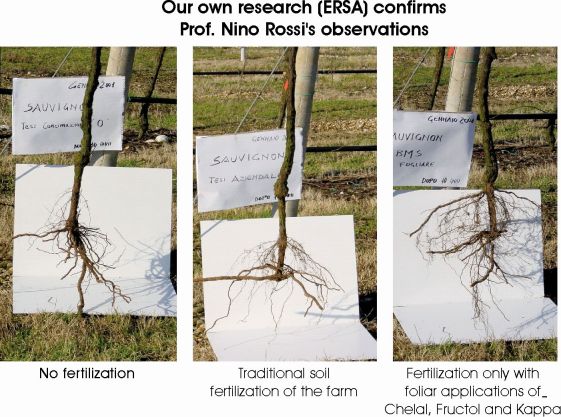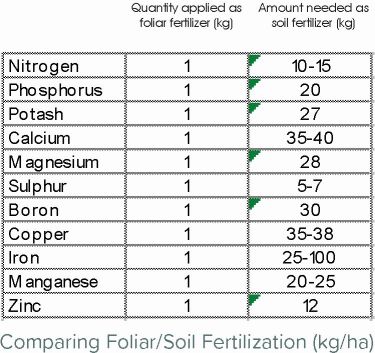You are here
10 reasons why you’ll prefer foliar nutrition

An increasing number of farmers are looking for ways to work more ecologically and therefore are turning to foliar nutrition, as a preferred choice. Foliar nutrition is, in fact, the ideal instrument for achieving the best results with respect to environmental protection. In addition to this ecological benefit, we also would like to highlight 10 other reasons why you should use foliar fertilization. Wondering if they could also benefit you? Read on.
1. It is the most efficient way to feed your crop
Soil applications are often ineffective and inefficient because the applied fertilizers interact negatively with the soil itself. As a result, the nutritional elements can be limited and sometimes are not available at all. This applies to all nutrients, both main and trace elements.
We estimate that of the soil fertilization with main elements, only 5 to 15% reaches the plant. For the trace elements this percentage is often even lower, sometimes not even 1%.
How does that happen? The following factors prevent nutrient elements from reaching the plant:
- acidity of the soil
- physicochemical properties of the soil
- texture of the soil
- mutual balances between the different elements
- weather conditions
Making soil fertilization more efficient is hardly achievable because we don’t have any influence on these factors. Foliar fertilization is not dependent on the soil and therefore offers a viable alternative.
2. Foliar nutrition stimulates root development
Our own test results and those referenced in respected expert literature, both indicate that foliar nutrition improves root growth. The total absorption capacity of the root system therefore increases. The plant will be able to absorb more water and nutrients because it reaches a larger volume of soil. As a result, the plant uses the reserves in the soil and the fertilizers more efficiently. The nutrition of your plants is more balanced and therefore increases your chances of a good harvest.
Dr Nino Rossi, from the University of Bologna, says the following: "The treatments with foliar fertilizers often stimulate the formation of additional root systems, longer and deeper compared to untreated plants. This better development will, in itself, result in a utilization of a larger soil volume, as a result of which, a greater absorption of water and nutrients from the soil is possible. These two types of absorption, via the leaf and the root, therefore work together in a positive way. "(1)

3. Compensate low activity of the roots
There are all kinds of causes of poor root functioning:
- asphyxia
- soil infections, nematoda
- soil compaction
- diseases
- high salt levels
As a result, they absorb no, or an insignificant quantity, of nutrients and the crop develops difficulties.
With foliar applications, we compensate the defective functioning of the roots. After all, fertilization through the leaf does not depend on the roots. In this way, the plant can still grow, recover and become stronger.
4. Foliar fertilization eliminates many common deficiencies
Because soil fertilization is not efficient, deficiencies often occur during the growth cycle of the plant. Foliar applications compensate the erratic and irregular soil absorption, which provokes these deficiencies. The CEC or cation exchange capacity of the leaves is just as strong as that of the root. In fact, both organs, leaf and root, have a similar absorption potential.
Leaves can therefore absorb large amounts of nutrients. This means that foliar applications are a more interesting manner to administer not only trace elements but also key elements. This way you avoid deficiencies and stunting of growth.
5. Foliar nutrition will immediately solve a deficiency
The consequences of stress due to deficiencies are drastic:
- The plant does not function optimally
- Photosynthesis is not occurring efficiently
- There is even a risk of a growth interruption
All of these affect productivity and your final yield. It is, therefore, very important to treat the deficiency as quickly as possible and to ensure the maximum output of your crop.
Rapid intervention is a distinct advantage of foliar nutrition: the effect is much faster than that obtained by soil applications. The plant absorbs the nutrients immediately. They almost instantaneously end up in the metabolism of the leaf, where the plant needs these nutrients the most.
With soil fertilization, it can take days to sometimes weeks, to tackle and eventually eliminate a deficiency, which is often detrimental to your yield.
In foliar applications there is obviously no risk of fixation of the nutrients in the soil. One more reason to prefer foliar nutrition to soil fertilization at crucial moments. If the plant has deficiencies, it is very important that the nutrients reach the affected areas, as quickly as possible.
6. With foliar nutrition you better control the growth of your crop
By using different nutritional balances in our foliar fertilization, we can steer the vigor of our plant.
- If the vigor is too low, we can stimulate growth more strongly with products rich in nitrogen.
- On the other hand, if the plant's vigor is too strong (which has a negative effect on the fruits) we can slow down growth. How? By foliar nutrition with products low in, or without, nitrogen and rich in potassium. This inhibits the growth strength without harming the plant and stimulates the plant to channel its energy to the fruits. This, ultimately, improves the quality of the fruits.
By applying certain elements at specific moments, we stimulate certain processes in the plant. For example, we can stimulate flowering by giving boron at the right time.
With foliar nutrition, you take the control of the crop development into your own hands.
7. Foliar fertilization increases the resistance of your plant
Well-fed plants are healthier! They are stronger, less sensitive to diseases and have a higher natural resistance to diseases.
To further increase this natural resistance, we recommend foliar applications with specific elements such as calcium, copper, silicon. These nutritional elements strengthen the plant.
We also recommend foliar fertilization for plants that recover from a disease or a pest attack. The recovery goes faster after a pesticide treatment because they are armed with the necessary nutrients.
8. Foliar nutrition improves the quality of your yield
With foliar fertilization we ensure a more balanced diet for the plant. We ensure that the nutritional elements that the plant needs are available at the right time, independent of their variable and uncertain availability in the soil. This prevents a series of disadvantages such as:
- too high nitrogen availability, which harms the fruit quality
- phosphorus fertilization, which causes a zinc deficiency and therefore reduces production
- boron deficiency that affects the uniformity of the fruits
- etc ...
Another important element for high-quality production is calcium.
Rarely, or never, is there an absolute deficiency of calcium in the soil and neither in the plant. But calcium does not always end up where it has to be: in the fruits. Solution? Calcium treatments with a good absorbable calcium chelate with a high mobility within the plant. This type of product allows you to increase the calcium concentration in the phloem, the plant juice that nourishes the fruits, resulting in a better quality of the fruits.
9. You’ll save time with foliar nutrition
Products in which the trace elements are well chelated can easily be mixed with many plant protection products. Of course, the quality and purity of the applied products plays an important role.
The products of BMS MN are easily combined and mixed with the most commonly used pesticides. Always consult our mixability list for your applications.
You can take advantage from each pesticide application to nourish your crop with the elements it needs at a given time. So, rarely or never will you have to enter the field only to treat your plants with foliar nutrition. Time is money!
10. You’ll save money with foliar nutrition
Because you supply nutrients more efficiently with foliar fertilization, you’ll need less soil fertilization. This saves you a lot of money.
You reduce not only the amount of fertilizer, but also you manage your crop in a more cost-effective way.

BONUS: Foliar nutrition is good for the environment!
Environmental legislation is becoming increasingly demanding and complex. Farmers must, therefore, follow stricter rules, not only for pesticides, but also for fertilizers. Pollution of rivers and groundwater is often linked to the excessive use of fertilizers. Governments - both national and European - therefore impose limits on the quantity of specific nutritional elements that you can administer directly to the soil. These quantities are often much lower than what is needed to obtain a high yield. Foliar nutrition can help here. With a well-thought-through foliar fertilization program, you can fill up the gaps of the reduced soil fertilization applications and keep the production up to standard. BMS MN has already proven this in various tests on hazelnut, wine grape, corn, pear,...: check out the results of field trials to your benefit.
The stricter regulations also have financial consequences. Your entitlement to European support (subsidy) sometimes depends on respecting these limits to the letter of the law. With foliar nutrition, you comply with these limits without loss of yield and, therefore, loss of income, and you continue to qualify for European support.
We’ll list the benefits of foliar fertilization once again:
- You’ll feed the plant more efficiently
- You’ll stimulate root development
- You’ll compensate for low activity of the roots
- You’ll eliminate common deficiencies
- You’ll immediately solve a deficiency
- You’ll control the growth rate of your crop
- You’ll increase the resistance of the plant
- You’ll improve the quality of your yield
- You win time
- You save money
Last but not least: you work more ecologically.
Curious about the benefits for your specific crop? Do you want a first analysis? Contact us!
(1) Assorbimento di elementi e concimazione fogliare. Nino Rossi, Istituto di chimica agraria Università di Bologna, Agronomia 14/2000 p69-73